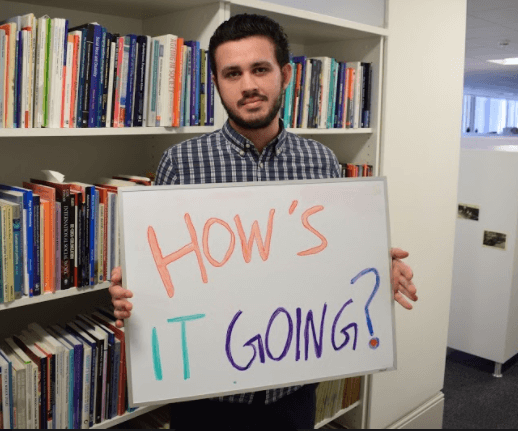
Bronwen Dalley Smith, Communications and Events Officer, Money and Mental Health
Men from London, let’s make #TimeToTalk
It can be difficult to tell someone you’re struggling – especially if you don’t know what they’ll think or how they’ll react. And these two unknowns are part of the reason that many people don’t talk about their mental health. But today is Time to Talk day, a day designed to change that.
Time to Talk day is part of the Time to Change campaign, launched to encourage people to be more open about their mental health, and to challenge how we think and act about mental health problems. Here at Money and Mental Health we rely on people opening up about their mental health, as all of our research is rooted in people’s lived experience.
Just before the new year, we reached an organisational milestone of gaining 5,000 members in our online Community – that’s 5,000 people sharing their experiences of mental health problems to shape our research. Whilst this gives a unique insight into the often toxic link between money and mental health, there are certain groups of voices that we don’t seem to be hearing from as often as others. In particular, we’re struggling to recruit enough men from London and the north west of England.
So who have we got?
To understand the demographics of our Research Community, we have split our members by gender and then into age groups. Putting gender aside for a moment, it is young people, aged 18-24, that we would particularly like to hear more from nationally. And regionally, it’s London, the east, and north west regions that need more people. But if we dive a little deeper and compare all of the different demographic factors, the two specific groups that we’re struggling to hear from are men aged 25-34 from London, and men living in the north west of the same age.
We’re delighted to be hearing from a lot of women in our Research Community, particularly in the south east of England – in fact, this region is home to the two groups we hear most from (women aged 45-54 in first place, closely followed by their 35-44 year old neighbours). It’s brilliant to have so many women of these ages involved, and they are making a real difference, but we now would like to see more men having their say.
Men and mental health
As anyone who has caught a glimpse of headlines in recent years will know, the statistics surrounding men and mental health, in particular suicide, make for a sobering read. The latest ONS data revealed that around three quarters of suicides in the UK in 2016 were by men, equating to almost 4,500 deaths. Yet despite male sports stars, royals, musicians and actors coming forward and opening up about their mental health, there is still a lack of men talking about it and seeking help. For example between 2015 and 2016, only 36% of referrals to the main NHS talking therapy programme, Improving Access to Psychological Therapies (IAPT), were men. So why, given that a mental health problem will affect one in four adults each year (and can affect anyone regardless of gender) are men not talking about it as much as women? And why are we lacking men in our mental health Community?
It seems that despite organisations and celebrities making great strides in reducing the stigma surrounding mental health, it unfortunately remains. This is why today is so important.
We need you
Martin Lewis set our charity up to help break the devastating link between financial difficulties and mental health problems. Hearing from people with real-life experience of the issues we are trying to tackle gives us the best chance of doing this. Joining our Research Community provides you with the opportunity to have your say on what the government, banks, retailers, regulators and the NHS should do to improve their practice – and improve the lives of people with mental health problems as a result.
We reached our 2017 milestone of gaining 5,000 Research Community members on the 355th day of the year, and have set our sights on evening out the Community’s gender imbalance in 2018 even more quickly. Can you help us get there?
